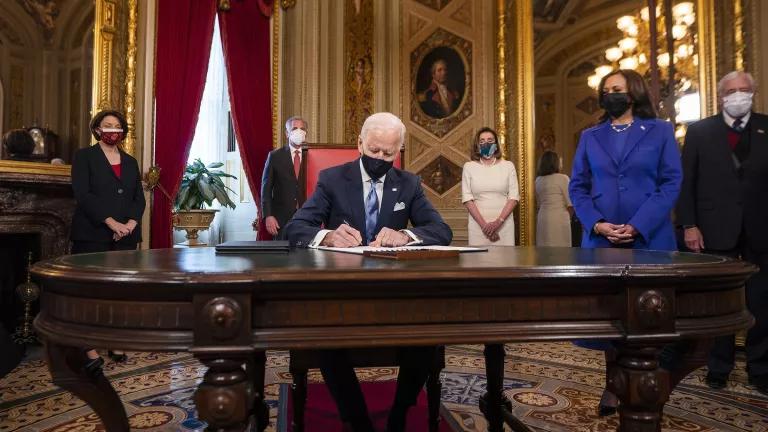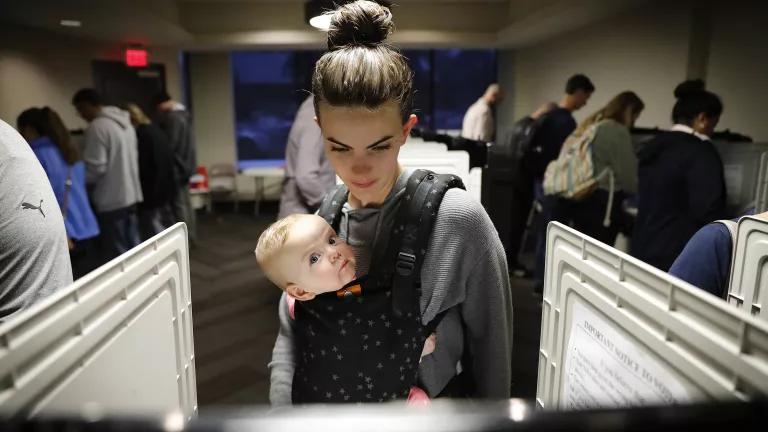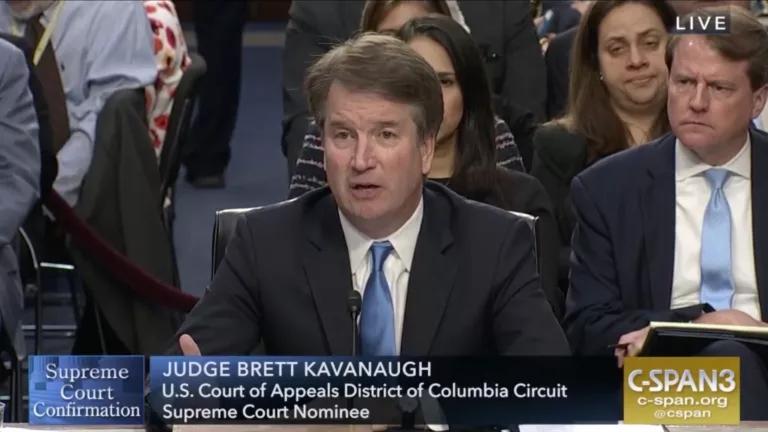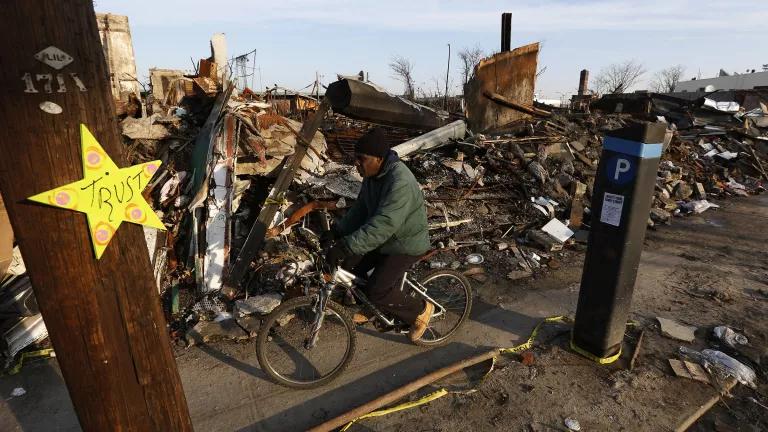Joe Biden Takes Office Embodying the Triumph of Democracy in a Winter of Peril
It’s now Biden’s job to address a raging pandemic, jump-start a stumbling economy, lead a national commitment to advance racial justice, and command the fight against the climate crisis.

President Joe Biden signs the inauguration declaration and other documents, with Vice President Kamala Harris (right) by his side, on January 20, 2021.
Watching today’s historic inauguration, I couldn’t help but be humbled by President Joe Biden’s call for national unity and renewal as together we face this “winter of peril.” I couldn’t help but feel pride at watching Senator Kamala Harris become the first woman, the first Black person, and the first Asian-American, to be sworn in as vice president of the United States. And I couldn’t help but be inspired by the tribute Biden paid to the resilience of our system of government in the face of attacks from within.
“The will of the people has been heard, and the will of the people has been heeded,” Biden said, standing before the Capitol just two weeks after it was sacked by violent extremists seeking to overturn that very public voice and will. “Democracy,” he said, “has prevailed.”
Democracy is the way we, the people, direct our government to serve on our behalf, and Biden has, indeed, heeded the call.
He hit the ground running on the most sweeping agenda in modern time for leading a nation reeling from intersecting crises: a catastrophic pandemic and the economic turmoil it’s caused; a long overdue reckoning with racial injustice; and a climate emergency that’s inflicting rising costs and mounting dangers on people in every corner of our country and around the world.
“Any one of these would be enough to challenge us in profound ways,” said Biden. “But, the fact is, we face them all at once.”
It’s now Biden’s job to address a raging pandemic that has killed more than 405,000 Americans, a quarter of them in just the past five weeks; jump-start a stumbling economy that’s left 10.7 million people out of work; lead a national commitment to advance racial justice; and command the fight against the climate crisis.
He’ll need our support—and he’ll need our help.
For the first time since the pandemic first struck a year ago, we have a president who’s proposed a comprehensive national plan to address the ongoing public health crisis, help our people cope with the economic pain it’s caused, and set the table for the recovery we need.
He’s called for $1.9 trillion in emergency relief to combat the pandemic, speed vaccinations, help frontline workers, and keep hard-hit households afloat for the time it takes for real recovery to begin. The package includes needed aid for struggling cities and states, to keep first responders on the job and essential services functioning. It extends assistance for those who’ve lost their jobs and businesses fighting to survive. It prioritizes assistance for the communities of color that have suffered disproportionate harm from the coronavirus pandemic. And it contains a down payment on the investment we need to “build back better.”
This is urgent relief the country desperately needs. The package deserves our full support and immediate passage in both houses of Congress.
Swift approval of this needed relief will help to advance two other urgent priorities for the nation. By demonstrating good governance in action, this package can help to unify a deeply divided public and shore up faith in our democracy.
Biden’s commitment to climate action is integral to this agenda. He understands that addressing the climate crisis is an urgent imperative. He knows, too, that doing so will improve public health, create millions of good-paying jobs, and help to address racial injustice and inequity.
It’s also a step toward unifying the country, and it’s a direct outgrowth of a functioning democracy.

Pete Johnson of Gemini Rope Access Solutions rappels down the blades of a 3 megawatt Alstom wind turbine during an inspection at the National Renewable Energy Laboratory in Golden, Colorado.
Dennis Schroeder/NREL, 27205
A solid majority of Americans, after all, want President Biden to take action on climate, a December poll by Yale and George Mason universities found. Fifty-three percent say global warming should be a high or very high priority for Biden and the new Congress; 66 percent say the same about developing clean energy; and eight in 10 favor tax breaks to support renewable energy research and purchases of solar panels or electric vehicles.
Little wonder why.
We just wrapped up the hottest decade since global record keeping began in 1880. The average global temperature for 2020 was 1.2 degrees Celsius above preindustrial levels.
We’ve all seen the impacts—across our communities and our nation, and out of our kitchen windows—in just the past year: seas rising along coasts battered by record-breaking hurricanes; windstorms and floods that devastated midwestern ranches and farms; western wildfires that burned enough land to cover the state of New Jersey.
All of this, and much more, will become catastrophically worse, the science tells us, unless we can hold climate warming to no more than 1.5 degrees Celsius. We’re perilously close to crossing that line. To keep from doing that, we need to cut the dangerous carbon pollution from burning fossil fuels in half by 2030 and eliminate or offset the rest by no later than 2050.
Within hours of taking office on Wednesday, Biden took swift and decisive action to begin setting us on the path to do just that.
He took executive action to rejoin the landmark Paris climate accord, positioning the United States to become, once more, part of the global climate solution—not the problem.
He rejected the Keystone XL tar sands pipeline, making clear that the country is moving away from the dirty fossil fuels of the past and toward cleaner, smarter ways to power our future.
And he directed every agency in the government to center racial justice and equity, in the policies they advance and the work that they do. That put environmental justice where it belongs—at the heart of the climate progress we need.
Biden also directed urgent action to:
- restore and strengthen the commonsense safeguards we depend on to defend the environment and public health, in the wake of four years of efforts by the Trump administration to cripple those protections, with a return to responsible public oversight rooted in sound science, the public interest, and the rule of law.
- cut the carbon pollution from cars, trucks, and dirty power plants that, together, account for roughly two-thirds of the nation’s carbon footprint.
- revise standards to help us reduce the emission of methane—a powerful climate-wrecking gas—and improve the efficiency of our appliances and buildings.
- restore essential protections to national monuments like Bears Ears, Grand Staircase-Escalante, and Northeast Canyons and Seamounts.
- block destructive oil and gas drilling in the Arctic National Wildlife Refuge.

Snow-capped mountains and the Canning River in the Arctic National Wildlife Refuge, Alaska
Biden, on day one of his presidency, set the stage for the comprehensive action we need to confront the climate crisis now, while there’s still time to act.
That’s what Biden promised during the campaign, when he laid out the strongest plan in history for national climate action, a pledge that helped him win the November election by more than 7 million votes.
Now he’s begun to deliver on that plan, a plan that calls for:
- investing $2 trillion over the next four years to help us become more energy efficient, build the world’s best electric vehicles, get more clean power from the wind and sun, and build the electricity grid and storage systems of the future.
- restoring and strengthening climate measures derailed by the Trump administration, and creating meaningful standards and policies to set the country on the path to zero-carbon electricity by 2035 and a carbon-neutral economy by 2050.
- directing at least 40 percent of clean energy investment toward low-income areas and communities of Black people, Indigenous people, and others suffering disproportionate climate hazard and harm, as a way to help create jobs and advance environmental justice, equitable opportunity, resilience and health in urban, rural, and tribal communities.
- protecting at least 30 percent of our public lands and federal waters by 2030 as a way to fight species collapse and conserve vital habitat, while promoting natural climate solutions by strengthening the health of forests, farms, and wetlands that take carbon from the atmosphere and lock it away in healthy soil.
Wednesday was a historic day for the country, a moment when we began to fulfill the great promise of our democracy, renewing our commitment to building a more just and equitable society.
Tomorrow, we’ll all get back to work doing our part in the great national task before us, the task of progress and healing amid opportunity and renewal.
For today, I’ll reflect on the transcendent words of 22-year-old Amanda Gorman, the youngest inaugural poet in our nation’s history, who reminded us that “There is always light, if only we’re brave enough to see it; if only we’re brave enough to be it.”




